七年级英语下册 Module 2 Unit 3 Different places第一课时教案 牛津沈阳版
七年级英语下册 Module 2 Unit 3 Different places(第四课时)教案 牛津沈阳版
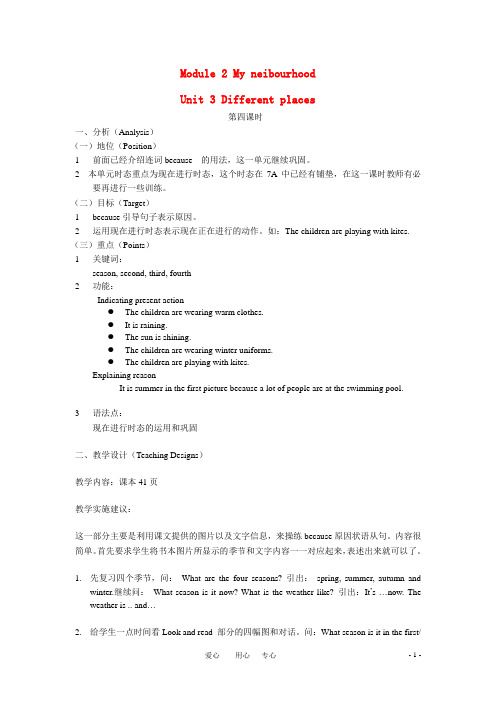
Module 2 My neibourhoodUnit 3 Different places第四课时一、分析(Analysis)(一)地位(Position)1 前面已经介绍连词because 的用法,这一单元继续巩固。
2 本单元时态重点为现在进行时态,这个时态在7A中已经有铺垫,在这一课时教师有必要再进行一些训练。
(二)目标(Target)1 because引导句子表示原因。
2 运用现在进行时态表示现在正在进行的动作。
如:The children are playing with kites. (三)重点(Points)1 关键词:season, second, third, fourth2 功能:Indicating present action●The children are wearing warm clothes.●It is raining.●The sun is shining.●The children are wearing winter uniforms.●The children are playing with kites.Explaining reasonIt is summer in the first picture because a lot of people are at the swimming pool.3语法点:现在进行时态的运用和巩固二、教学设计(Teaching Designs)教学内容:课本41页教学实施建议:这一部分主要是利用课文提供的图片以及文字信息,来操练because原因状语从句。
内容很简单。
首先要求学生将书本图片所显示的季节和文字内容一一对应起来,表述出来就可以了。
1.先复习四个季节,问:What are the four seasons? 引出:spring, summer, autumn andwinter.继续问:What season is it now? What is the weather like? 引出:It’s …now. The weather is .. and…2.给学生一点时间看Look and read 部分的四幅图和对话。
辽宁省法库县东湖第二初级中学七年级英语下册 Module 2 Unit 3 different pl
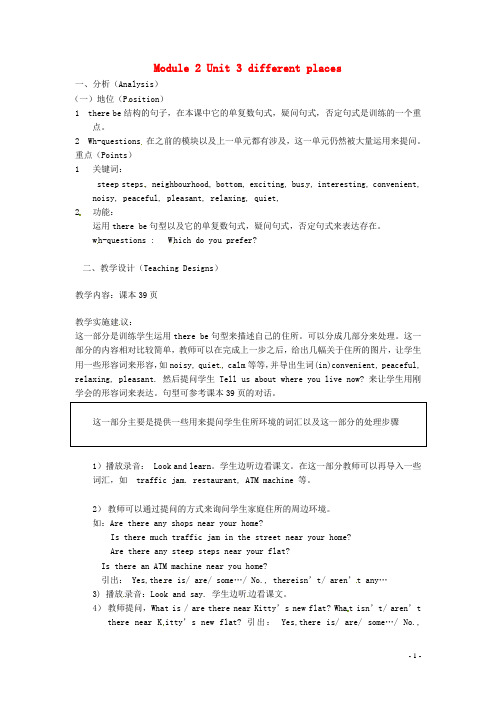
Module 2 Unit 3 different places一、分析(Analysis)(一)地位(P osition)1 there be结构的句子,在本课中它的单复数句式,疑问句式,否定句式是训练的一个重点。
2 Wh-questions在之前的模块以及上一单元都有涉及,这一单元仍然被大量运用来提问。
重点(Points)1 关键词:steep steps, neighbourhood, bottom, exciting, bus y, interesting, convenient, noisy, peaceful, pleasant, relaxing, quiet,2功能:运用there be句型以及它的单复数句式,疑问句式,否定句式来表达存在。
w h-questions : W hich do you prefer?二、教学设计(Teaching Designs)教学内容:课本39页教学实施建议:这一部分是训练学生运用there be句型来描述自己的住所。
可以分成几部分来处理。
这一部分的内容相对比较简单,教师可以在完成上一步之后,给出几幅关于住所的图片,让学生用一些形容词来形容,如noisy, quiet, calm等等,并导出生词(in)convenient, peaceful, relaxing, pleasant. 然后提问学生Tell us about where you live now? 来让学生用刚学会的形容词来表达。
句型可参考课本39页的对话。
这一部分主要是提供一些用来提问学生住所环境的词汇以及这一部分的处理步骤1)播放录音: Look and learn。
学生边听边看课文。
在这一部分教师可以再导入一些词汇,如 traffic jam. restaurant, ATM machine 等。
2)教师可以通过提问的方式来询问学生家庭住所的周边环境。
如:Are there any shops near your home?Is there much traffic jam in the street near your home?Are there any steep steps near your flat?Is there an ATM machine near you home?引出: Yes,the re is/ are/ some…/ No., thereisn’t/ aren’t any…3) 播放录音:Look and say. 学生边听边看课文。
牛津深圳版英语七年级下册Module2unit3重难点知识总结
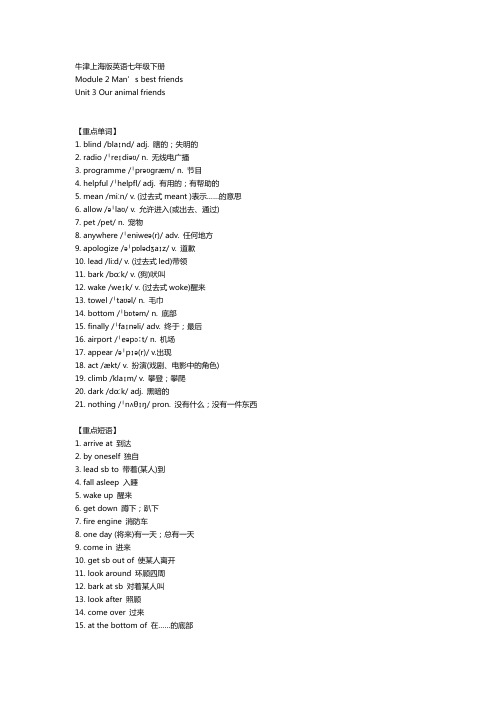
牛津上海版英语七年级下册Module 2 Man’s best friendsUnit 3 Our animal friends【重点单词】1. blind /blaɪnd/ adj. 瞎的;失明的2. radio /ˈreɪdiəʊ/ n. 无线电广播3. programme /ˈprəʊɡræm/ n. 节目4. helpful /ˈhelpfl/ adj. 有用的;有帮助的5. mean /miːn/ v. (过去式meant )表示……的意思6. allow /əˈlaʊ/ v. 允许进入(或出去、通过)7. pet /pet/ n. 宠物8. anywhere /ˈeniweə(r)/ adv. 任何地方9. apologize /əˈpɒlədʒaɪz/ v. 道歉10. lead /li:d/ v. (过去式led)带领11. bark /bɑːk/ v. (狗)吠叫12. wake /weɪk/ v. (过去式woke)醒来13. towel /ˈtaʊəl/ n. 毛巾14. bottom /ˈbɒtəm/ n. 底部15. finally /ˈfaɪnəli/ adv. 终于;最后16. airport /ˈeəpɔːt/ n. 机场17. appear /əˈpɪə(r)/ v.出现18. act /ækt/ v. 扮演(戏剧、电影中的角色)19. climb /klaɪm/ v. 攀登;攀爬20. dark /dɑːk/ adj. 黑暗的21. nothing /ˈnʌθɪŋ/ pron. 没有什么;没有一件东西【重点短语】1. arrive at 到达2. by oneself 独自3. lead sb to 带着(某人)到4. fall asleep 入睡5. wake up 醒来6. get down 蹲下;趴下7. fire engine 消防车8. one day (将来)有一天;总有一天9. come in 进来10. get sb out of 使某人离开11. look around 环顾四周12. bark at sb 对着某人叫13. look after 照顾14. come over 过来15. at the bottom of 在……的底部【重点句型】1. —Why are you doing that?你为什么那样做呢?—Because I want to make friends with him!因为我想和他做朋友!2. You’re welcome to stay, but I’m sorry that we don’t allow pets here.欢迎你留下来,但很抱歉我们这里不允许养宠物。
七下Module 2《Unit3 Different places》(Lesson 4)PPT(牛津沈阳版)PPT课件
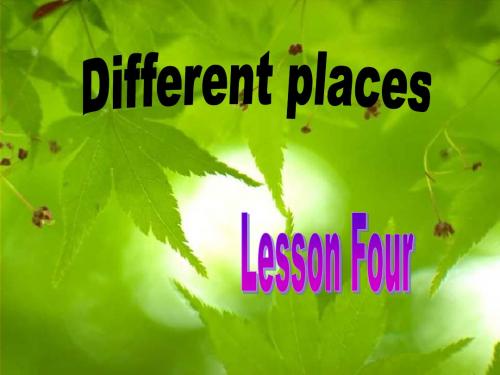
There are some photographs of Rose Garden Estate. Are they the same or different?
first
second
third
fourth
T: Look, children. These are some photographs of Rose Garden Estate. Are they the same or different ? S1:They look the same. S2:They’re the same place, but the seasons are 播放 暂停 different.
winter
spring
Choose one of the set. (about 50 words)
summer
autumn
1.Finifh off the workbook. 2.Talk about the other seasons .
leaves on the trees
rain
fall
from
the
trees
lots of flowers
because 1. It is winter _________ the children are wearing warm clothes. 2. It is ________ because a lot of people are at the swimming pool. summer 3. It ____ raining , it is ___________. spring 4. It isis summer, because it is very_________. hot 5. It is _______because the children are wearing winter uniforms. winter 6. Because there are lots of __________,it is summer. 7. There are no leaves on the trees, so it’s_________. flowers 8. Look! The leaves are red, it’s _________ now. winter 9. We like playing with kites in _________. autumn 10.We are twins, we look the _________. autumn same
2019-2020年七年级英语下册 Module 2 Unit 3 Different places
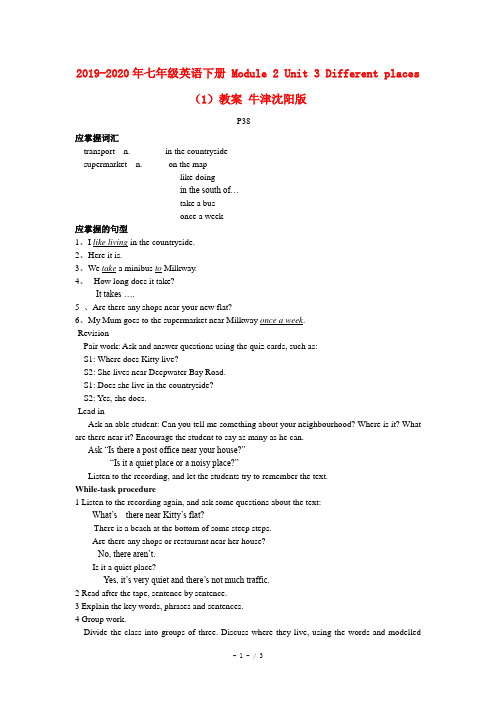
2019-2020年七年级英语下册 Module 2 Unit 3 Different places(1)教案牛津沈阳版P38应掌握词汇transport n. in the countrysidesupermarket n. on the maplike doingin the south of…take a busonce a week应掌握的句型1、I like living in the countryside.2、Here it is.3、We take a minibus to Milkway.4、--How long does it take?-- It takes ….5 、Are there any shops near your new flat?6、My Mum goes to the supermarket near Milkway once a week.·RevisionPair work: Ask and answer questions using the quiz cards, such as:S1: Where does Kitty live?S2: She lives near Deepwater Bay Road.S1: Does she live in the countryside?S2: Yes, she does.·Lead inAsk an able student: Can you tell me something about your neighbourhood? Where is it? What are there near it? Encourage the student to say as many as he can.Ask “Is there a post office near your house?”“Is it a quiet place or a noisy place?”Listen to the recording, and let the students try to remember the text.While-task procedure1 Listen to the recording again, and ask some questions about the text:·--What’s there near Kitty’s flat?--There is a beach at the bottom of some steep steps.·--Are there any shops or restaurant near her house?--No, there aren’t.·--Is it a quiet place?---Yes, it’s very quiet and there’s not much traffic.2 Read after the tape, sentence by sentence.3 Explain the key words, phrases and sentences.4 Group work.Divide the class into groups of three. Discuss where they live, using the words and modelledconversation inAsk and answer. Teach the new words, and help them look up the dictionary if they need.5 Activity.Ask the Ss to draw their neighbourhood on the paper, and then write something about it. Encourage the Ss to e to the front, show their pictures and introduce their neighbourhood to the rest of the class.HomeworkWrite a short passage about their own neighbourhood.-----如有帮助请下载使用,万分感谢。
Module2Unit 3(初一下册课件)
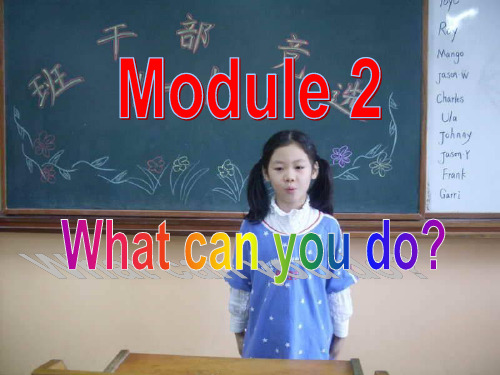
4. Sally会放风筝,我也会。 _S_a_ll_y__ca_n__f_ly__a_k_i_t_e,_I__c_a_n_f_ly__a_k__it_e_, _to_o_._. 5. Bill会说法语,但他不会说俄语。 __B_il_l_c_a_n__sp_e_a_k__F_r_e_n_c_h_,_b_u_t_h__e_c_a_n_’_t ___ __sp_e_a_k__R_u__ss_i_a_n_. ____________________. 6. 他们不会说西班牙语和阿拉伯语。 _T_h_e_y__c_a_n_’t__sp__ea_k__S_p_a_n_i_s_h_o_r__A_r_a_b_i_c.___.
They can run really fast.
Can you run fast? No, I can’t.
He can play the piano. Can you play the piano?
He can ride a bike. Can you ride a bike? Yes, I can.
2. 在变一般疑问句时,直接移到主语 前(原主语的首字母改成小写,第一 人称应变为第二人称)即可。例如:
I can see an orange on the table. → Can you see an orange on the table? 其回答可用Yes, OK或Certainly等作肯 定回答;用No或Sorry等作否定回答。 例如:
2. 表示请求或允许,多用在口语中,意 为“可以;能”等。用于疑问句中用来 提出要求,用于否定句表示不允许。例 如: Can I help you? 我能帮助你吗? You can’t play basketball. 你不能玩篮球。
2020-2021学年外研英语七年级下册Module2Unit3教案

(三)实践活动(用时10分钟)
1.分组讨论:学生们将分成若干小组,每组讨论一个与地点和方向相关的实际问题。
2.实验操作:为了加深理解,我们将进行一个简单的实验操作,如角色扮演描述路线,这个操作将演示如何运用所学知识。
二、核心素养目标
本章节的核心素养目标主要包括以下方面:
1.语言能力:通过学习地点和方向的表达,提高学生运用英语进行空间描述的能力,培养他们准确、流畅地使用英语进行交流;
2.思维品质:培养学生逻辑思维和空间想象能力,使他们能够运用所学知识解决实际问题,如描述路线、找到目的地等;
3.文化意识:让学生了解不同国家和地区的地理环境,培养他们的国际视野,增强对多元文化的尊重和理解;
2020-2021学年外研英语七年级下册Module 2 Unit3教案
一、教学内容
2020-2021学年外研英语七年级下册Module 2 Unit3的内容主要围绕“地点和方向”展开,包括以下知识点:
1.地点名词的使用:如公园、图书馆、超市等;
2.方向词的运用:如左转、右转、直行等;
3.描述路线的句型:How can I get to...? You can go... Then turn...;
(二)新课讲授(用时10分钟)
1.理论介绍:首先,我们要了解地点名词和方向词的基本概念。地点名词如park、library等,方向词如left、right等,它们是我们描述路线和位置的关键词汇。
2.案例分析:接下来,我们来看一个具体的案例。这个案例展示了如何运用所学词汇和句型在实际中找到某个地点,以及它们如何帮助我们解决问题。
英语七年级下册作文2和3单元

英语七年级下册作文2和3单元English:In unit 2 and 3 of the seventh grade English textbook, we learned about different forms of entertainment and travel experiences. In unit 2, we explored the topic of entertainment, including sports, movies, and music. We learned about different types of sports and leisure activities, as well as how to describe and discuss our favorite entertainment preferences. In unit 3, the focus shifted to travel experiences, where we learned about different types of travel, such as adventure travel, cultural travel, and eco-friendly travel. We also studied vocabulary related to transportation and accommodations, and practiced expressing our travel experiences and preferences. Overall, these units have expanded our knowledge of different forms of entertainment and travel, and have equipped us with the language skills to talk about our leisure activities and travel experiences in English.Translated content:在七年级英语教科书的第二和第三单元中,我们学习了不同形式的娱乐和旅行经历。
外研版英语七年级下册Module3_Unit2第3课时单元教案与反思2022年

Unit2第3课时物以类聚,人以群分。
《易经》原创不容易,【关注】,不迷路!自主学习方案1.学生自学新词汇(见教材P105)。
2.学生自学教材(P16),找出课文中重点词组和句子。
课堂导学方案Step1情景导入教师说五·一快到了,问同学们有什么计划。
并邀请几组学生进行演说。
环节说明:由学生们自己的切身愿望和打算的发言激发他们发言的积极性,又引起他们学习的兴趣,同时也复习了begoingto的用法。
Step2完成教材1的任务1.大声朗读短文并仔细观察图片,然后把人物和图片相匹配。
2.教师告诉学生当文章有图片时,这些图片常包括一些重要信息,所以我们在读文章之前一定要仔细看图片,这样使文章更容易理解。
3.小结训练。
汉译英。
(1)我们要去为运动员们加油。
Wearegoingtoclookingforwardtotatcorrow.(3)我要在五月好好玩一玩。
I’mgoingtoenjoymyselfduringtay.环节说明:任务1让学生对短文有初步的了解,同时小结训练让学生对短文进一步的理解。
Step3阅读教材2的任务1.再次大声朗读2,完成下列表格,在他们将要做的事情上打钩(√)。
2.邀请学生给出答案,集体核对。
3.分组讨论短文中的难点句子,教师再详细讲解,学生熟记语言重点。
4.放录音,学生跟读。
5.小结训练。
(C)(1)MyfriendsandIaregoingtoourfavouriteteam.A.lookB.seeC.watclookingforwardtofromyou.A.selfB.myselfC.tselves环节说明:通过阅读短文2提高学生阅读理解能力,学生熟记以及听力和小结训练使学生更加熟悉教材的同时可巩固短语的用法。
Step4问题探究lookforwardto意为“期待,盼望”,其中to是介词,后面跟名词、代词或动词的ing形式作宾语,不跟动词不定式。
如:I’mlookingforwardtoyourletter.Step5家庭作业请完成模块3Unit2第3课时的练习题。
七年级英语Module 2 Neighborhood Unit 3 Different place
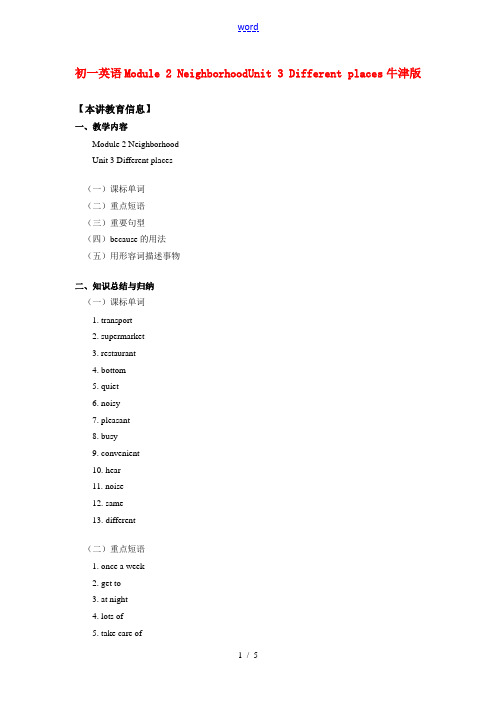
初一英语Module 2 NeighborhoodUnit 3 Different places牛津版【本讲教育信息】一、教学内容Module 2 NeighborhoodUnit 3 Different places(一)课标单词(二)重点短语(三)重要句型(四)because的用法(五)用形容词描述事物二、知识总结与归纳(一)课标单词1. transport2. supermarket3. restaurant4. bottom5. quiet6. noisy7. pleasant8. busy9. convenient10. hear11. noise12. same13. different(二)重点短语1. once a week2. get to3. at night4. lots of5. take care of6. look the same(三)重要句型1. How long does it take?2. It takes about 40 minutes.3. Which do you prefer?4. I prefer the countryside.5. It is spring because the children are playing with kites.6. The sun is shining.7. The city is convenient, but noisy.(四)because的用法because是连词,后边跟句子because of后边加名词或者动名词短语He came to work late because he got up late.He came to work late because of getting up late.用法上because 后加上一个句子We won’t go there because it’s going to rain.而because of除了“因为”外,还有“thanks to” 的意思,后加上一个词或短语We won’t go there because of rain.We won’t go there because of the bad weather.for也可用来表示原因,如:For everyone is here, let’s begin the meeting.for有很多其他用法:1. 表示“当作、作为”。
外研版英语七年级下册精品课件 Module 2 Unit 3
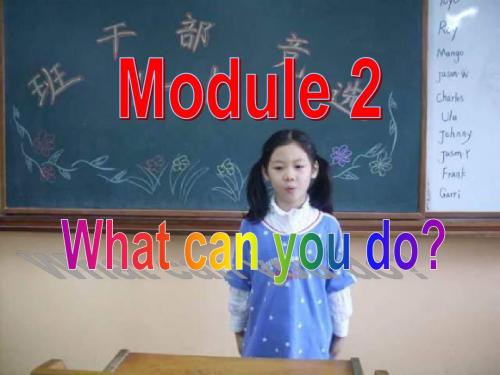
二、句式变化如下: 1. 在变否定句时,直接在can后加上 “not”,可缩写成can’t或cannot, 但不能写 成cann’t。例如: He can swim. → He can’t swim. Tony can see the pen on the desk. → Tony can not see the pen on the desk.
Can you help me, please? 请你帮助我好吗?
3. 表示可能。例如: He can be at home now. 他现在可能在家。
The moon can’t always be full. 月亮不可能常圆。 4. 表示怀疑。在表达此意时,只能用于 一般疑问句中,带有感情色彩。例如: Can it be true? 那会是真的吗?
Review the sentences that we have studied in Unit 1 and Unit 2.
She can cook. Can you cook? Yes, I can. / No, I can’t.
Can you play basketball well? Yes, I can. / No, I can’t.
Now write questions for each activity. Can you fly a kite? Work with another pair. Ask and answer the questions you wrote in Activity 1. — Can you fly a kite? — Yes, I can. / No, I can’t. Now give a report of your questions and answers to the rest of the class. Four students can fly a kite…
辽宁省法库县东湖第二初级中学七年级英语下册 Module 2 Unit 3 Different pl
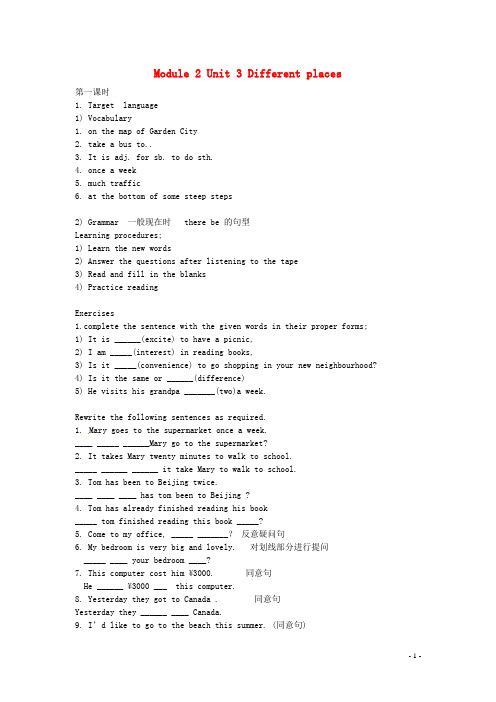
Module 2 Unit 3 Different places第一课时1. Target language1) Vocabulary1. on the map of Garden City2. take a bus to..3. It is adj. for sb. to do sth.4. once a week5. much traffic6. at the bottom of some steep steps2) Grammar 一般现在时 there be 的句型Learning procedures;1) Learn the new words2) Answer the questions after listening to the tape3) Read and fill in the blanks4) Practice readingExercisesplete the sentence with the given words in their proper forms;1) It is ______(excite) to have a picnic,2) I am _____(interest) in reading books,3) Is it _____(convenience) to go shopping in your new neighbourhood?4) Is it the same or ______(difference)5) He visits his grandpa _______(two)a week.Rewrite the following sentences as required.1. Mary goes to the supermarket once a week.____ _____ ______Mary go to the supermarket?2. It takes Mary twenty minutes to walk to school._____ ______ ______ it take Mary to walk to school.3. Tom has been to Beijing twice.____ ____ ____ has tom been to Beijing ?4. Tom has already finished reading his book_____ tom finished reading this book _____?5. Come to my office, _____ _______?反意疑问句6. My bedroom is very big and lovely. 对划线部分进行提问_____ ____ your bedroom ____?7. This computer cost him ¥3000. 同意句He ______ ¥3000 ___this computer.8. Yesterday they got to Canada . 同意句Yesterday they ______ ____ Canada.9. I’d like to go to the beach this summer. (同意句)I ___ ___ go to the beach this summer.10. Doctor, what’s wrong with my eyes? (同意句)Doctor, _____ ___ _____ with my eyes?第二课时1.Target language1) Vocabulary1. get up late2.walk to school=go to school on foot3.go to a restaurant4. take sb. to somewhere5.swim in a swimming pool2) StructureWhen 引导的时间状语从句When we lived in the city center, we got up late and walked to school.Prevision:1.Give the words with past forms and past participlesbuy____ _____ bring ____ _____ talk____ _____tell____ _____ give ____ _____ keep____ _____run ____ _____ choose____ _____ leave____ _____lose____ _____ have ____ _____ teach ____ _____say ____ _____ make____ _____Learning procedures1) Revision2) Listening and practicing readingWhere? What…do?In the pastNowadays3)Using the new structureConclusionI. Write about Sandy’s and Sally’s life now and in the past:II. Rewrite the following sentences as require d.1.I’d like a flat with a bigger bedroom and a balcony. (对划线部分进行提问)_____ _____ _____flat _____ you like?2. The flat is very small. We can’t live in this flat. (并成一句)The flat is ____ small ___us ____ _____ ____.3. I think this coat costs 1998 yuan or 2000 yuan. (同意转换)I think this coat costs ____ _____ _____ 2000 yuan.4. Betty would like to move to her new flat. (反意疑问句)Betty would like to move to h er new flat, _____ ___?III. Fill in the blanks:1.We _______already ______(build) so many tall buildings in Shanghai.2.Mr. John often ______( empty )the rubbish bins in the street.3.What about _______ (go) out for a walk?4.When they lived in the city, they often _______(g o) out at night.5.One day, Jack had an accident when he ____(walk) to the park with his friend.6.Your brother ____(phone) when you were out.7.When we _______(live) in the city centre, we ______(get) up late and ____(walk) to school.8.When I ______(grow )up ,I ____ (want )to be a teacher.第三课时1. Target language1) Vocabulary1. on the map of Garden City2. take a bus to..3. It is adj. for sb. to do sth.4. once a week5. much traffic6. at the bottom of some steep steps2) Grammar 一般现在时 there be 的句型Learning procedures;1) Learn the new words2) Answer the questions after listening to the tape3) Read and fill in the blanks4) Practice readingExercisesplete the sentence with the given words in their proper forms;1) It is ______(excite) to have a picnic,2) I am _____(interest) in reading books,3) Is it _____(convenience) to go shopping in your new neighbourhood?4) Is it the same or ______(difference)5) He visits his grandpa _______(two)a week.Rewrite the following sentences as required.1. Mary goes to the s upermarket once a week.____ _____ ______Mary go to the supermarket?2. It takes Mary twenty minutes to walk to school._____ ______ ______ it take Mary to walk to school.3. Tom has been to Beijing twice.____ ____ ____ has tom been to Beijing ?4. Tom has already finished reading his book_____ tom finished reading this book _____?5. Come to my office, _____ _______?反意疑问句6. My bedroom is very big and lovely. 对划线部分进行提问_____ ____ your bedroom ____?7. This computer cost him ¥3000. 同意句He ______ ¥3000 ___this computer.8. Yesterday they got to Canada . 同意句Yesterday they ______ ____ Canada.9. I’d like to go to the beach this summer. (同意句)I ___ ___ go to the beach this summer.10. Doctor, what’s wrong with my eyes? (同意句)Doctor, _____ ___ _____ with my eyes?第四课时1) Vocabulary1. get up late2.walk to school=go to school on foot3.go to a restaurant4. take sb. to somewhere5.swim in a swimming pool2) StructureWhen 引导的时间状语从句When we lived in the city center, we got up late and walked to school.Prevision:1.Give the words with past forms and past participlesbuy____ _____ bring ____ _____ talk____ _____tell____ _____ give ____ _____ keep____ _____run ____ _____ choose____ _____ leave____ _____lose____ _____ have ____ _____ teach ____ _____say ____ _____ make____ _____Learning procedures1) Revision2) Listening and practicing readingWhere?What…do?In the pastNowadays3) Using the new structureConclusionI. Write about Sandy’s and Sally’s life now and in the past:II. Rewrite the following sentences as required.1.I’d like a flat with a bigger bedroom and a balcony. (对划线部分进行提问) _____ _____ _____flat _____ you like?2. The flat is very small. We can’t live in this flat. (并成一句)The flat is ____ small ___us ____ _____ ____.3. I think this coat costs 1998 yuan or 2000 yuan. (同意转换)I think this coat costs ____ _____ _____ 2000 yuan.4. Betty would like to move to her new flat. (反意疑问句)Betty would like to move to her new flat, _____ ___?III. Fill in the blanks:1.We _______already ______(build) so many tall buildings in Shanghai.2.Mr. John often ______( empty )the rubbish bins in the street.3.What about _______ (go) out for a walk?4.When they lived in the city, they often _______(go) out at night.5.One day, Jack had an accident when he ____(walk) to the park with his friend.6.Your brother ____(phone) when you were out.7.When we _______(live) in the city centre, we ______(get) up late and ____(walk) to school.8.When I ______(grow )up ,I ____ (want )to be a teacher.第五课时1.Target language1) Vocabulary & Structure1. This is a picture of …2. There is a lot of /not mu ch…3. There are some/a lot of4. It is … because…5. What did you do when you lived…?6. The leaves are falling7. Make nests in the treesExercises从所给的两个选项中选出一个正确的填空:1. The teacher is sitting ____ (between, among) Tom and Mike .2. There is a beautiful house ____ ( between, among) the trees.3. They are walking ____ ( around, among) the street.4. There is a big tree ___ ( in front of, in the front of) the house.5. He stood ___ ( opposite, in the front of) me.6. He is walking ____ ( across, cross) the street.7. I ___ ( looked for, found) my watch every place but I didn’t ( look for, find) it.8.Why are you in _____ (so, such) a hurry?9.Turn ____ (off, of) the TV, please.10.Mary can speak _____ (good, well) English.11.We’ve got no lessons _____ (in, on) Saturday.12. _____ (Which, What) skirt do you like? The red one.13. Look! The clock is _____ (slowly, slow).14.Can you get the book ____ (for, to) me?15.There is ___ (a, an) “u” in the “uncle”.ClozeA new kind of phone is mobile phone. As we all know, it is s 8 enough for peopleto fit into the pockets. So it is convenient. But mobile phone has become a problemfor the school these years. Several children have got mobile phones as p 9 , and more students will want them.Many teachers say the use of mobile phone makes the students think less about their study. And it also gives teachers so much t 10 in their classrooms.Many teachers say students should not have mobile phones at school, if there isa good reason, they can leave their phones at school offices. They also say t 11 are many reasons why the students should not have mobile phones at school, suchas they are easy to lose and so on.Some university teachers also say that sometimes students may use phone messagesto cheat during e 12 .But some parents don’t think so. They give their children mobile phones in orderto keep in touch w 13 them.。
最新新外研版七年级下英语课件Module2 Unit3
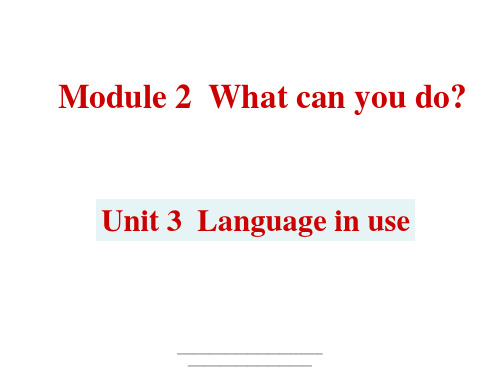
Unit 3 Language in use
___________________________ _______________________
Revision
play football
They can play football. I can’t play football.
___________________________ _______________________
play the piano
Lang Lang can play the piano well. Li Yundi can play the piano well, too.
___________________________ _______________________
___________________________ _______________________
They can _p_la_y__f_o_o_tb_a_l_l. He can s_w__im__.
___________________________ _______________________
swim
Sun Yang can swim. My sister can’t swim.
___________________________ _______________________
ride a bike
Wang Zhen can ride a bike. The man can’t ride a bike.
She can d_a_n__ce_.
He can _c_o_o_k_.
He can _p_l_a_y_t_h_e_p____i__a___n___o_______._________H___e__ can _s_in_g__. _______________________
2019-2020年七年级英语下册 Module 2 Unit 3 Different places(第一课时)教案 牛津沈阳版
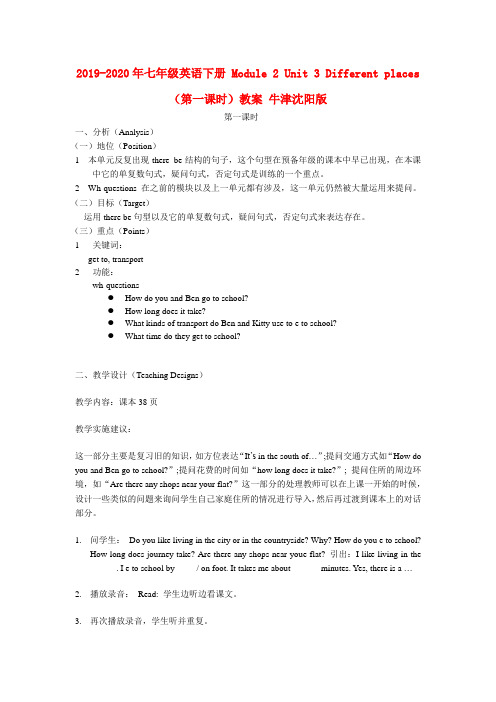
2019-2020年七年级英语下册 Module 2 Unit 3 Different places(第一课时)教案牛津沈阳版第一课时一、分析(Analysis)(一)地位(Position)1 本单元反复出现there be结构的句子,这个句型在预备年级的课本中早已出现,在本课中它的单复数句式,疑问句式,否定句式是训练的一个重点。
2 Wh-questions 在之前的模块以及上一单元都有涉及,这一单元仍然被大量运用来提问。
(二)目标(Target)运用there be句型以及它的单复数句式,疑问句式,否定句式来表达存在。
(三)重点(Points)1 关键词:get to, transport2 功能:wh-questions●How do you and Ben go to school?●How long does it take?●What kinds of transport do Ben and Kitty use to e to school?●What time do they get to school?二、教学设计(Teaching Designs)教学内容:课本38页教学实施建议:这一部分主要是复习旧的知识,如方位表达“I t’s in the south of…”;提问交通方式如“How do you and Ben go to school?”;提问花费的时间如“how long does it take?”; 提问住所的周边环境,如“Are there any shops near your flat?”这一部分的处理教师可以在上课一开始的时候,设计一些类似的问题来询问学生自己家庭住所的情况进行导入,然后再过渡到课本上的对话部分。
1.问学生:Do you like living in the city or in the countryside? Why? How do you e to school?How long does journey take? Are there any shops near youe flat? 引出:I like living in the ______. I e to school by_____/ on foot. It takes me about ______ minutes. Yes, there is a …2.播放录音:Read: 学生边听边看课文。
七年级下册英语第2和第3单元的作文

The Magic of Music and the Splendor ofSportsIn the world of junior high school life, music and sports occupy a unique and essential place. They not only provide us with an outlet for relaxation and entertainment but also shape our characters and enrich our school experiences.Music, as an art form, has the power to evoke emotions and create memories. In Unit 2 of our seventh-grade English textbook, we are introduced to the diverse genres of music and their respective cultural significance. From thesoulful melodies of classical music to the rhythmic beats of pop songs, music has the ability to transport us to different places and times. It can inspire us to dream, to feel, and to express ourselves. Whether we are listening to music alone or dancing to it with friends, it becomes a medium of connection and expression.On the other hand, sports play a crucial role in promoting physical health and team spirit. In Unit 3, we learn about the importance of regular exercise and the various sports activities that can be enjoyed.Participating in sports not only improves our physical fitness but also helps us develop discipline, resilience, and a sense of accomplishment. Team sports, in particular, teach us the value of collaboration, communication, and leadership. Whether we are playing soccer on the field or competing in a track event, sports provide us with an opportunity to test our limits and push ourselves to be better.Moreover, both music and sports have the potential to bring people together and create a sense of community. School concerts and sports events are often highly anticipated occasions that bring students, teachers, and parents together in a shared experience. These events not only showcase our talents but also foster a sense of pride and belonging within our school community.In conclusion, music and sports are two integral aspects of junior high school life that contribute significantly to our overall development. They provide us with an outlet for creativity and expression, promote physical health, and foster a sense of community. As we continue to explore and embrace these two wonderful worlds,we will undoubtedly find that they enrich our lives in ways that are both meaningful and memorable.**音乐之魅与运动之彩**在初中生活的世界里,音乐和运动占据了独特而重要的地位。
2019-2020年七年级英语下册 Module 2 Unit 3 Different places
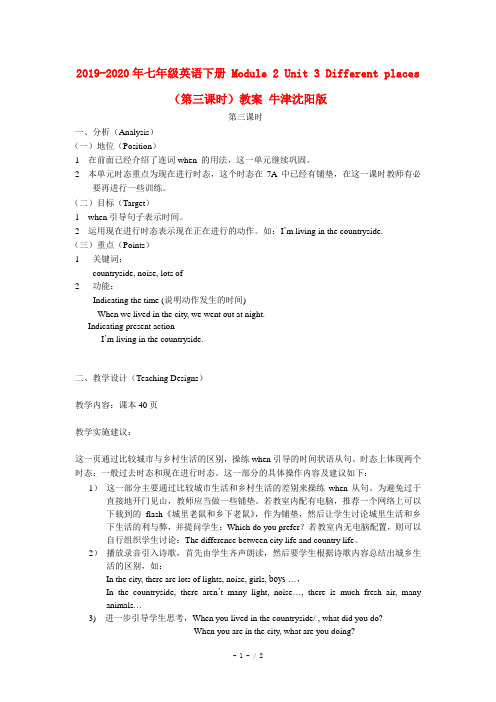
2019-2020年七年级英语下册 Module 2 Unit 3 Different places(第三课时)教案牛津沈阳版第三课时一、分析(Analysis)(一)地位(Position)1 在前面已经介绍了连词when 的用法,这一单元继续巩固。
2 本单元时态重点为现在进行时态,这个时态在7A中已经有铺垫,在这一课时教师有必要再进行一些训练。
(二)目标(Target)1 when引导句子表示时间。
2 运用现在进行时态表示现在正在进行的动作。
如:I’m living in the countryside.(三)重点(Points)1 关键词:countryside, noise, lots of2 功能:Indicating the time (说明动作发生的时间)When we lived in the city, we went out at night.Indicating present actionI’m living in the countryside.二、教学设计(Teaching Designs)教学内容:课本40页教学实施建议:这一页通过比较城市与乡村生活的区别,操练when引导的时间状语从句。
时态上体现两个时态:一般过去时态和现在进行时态。
这一部分的具体操作内容及建议如下:1)这一部分主要通过比较城市生活和乡村生活的差别来操练when从句。
为避免过于直接地开门见山,教师应当做一些铺垫。
若教室内配有电脑,推荐一个网络上可以下载到的flash《城里老鼠和乡下老鼠》,作为铺垫,然后让学生讨论城里生活和乡下生活的利与弊,并提问学生:Which do you prefer?若教室内无电脑配置,则可以自行组织学生讨论:The difference between city life and country life。
2)播放录音引入诗歌,首先由学生齐声朗读,然后要学生根据诗歌内容总结出城乡生活的区别,如:In the city, there are lots of lights, noise, girls, boys …,In the countryside, there aren’t many light, noise…, there is much fresh air, manyanimals…3)进一步引导学生思考,When you lived in the countryside/ , what did you do?When you are in the city, what are you doing?- 1 - / 24)接下来利用课本提供的素材,操练when从句。
七年级下册英语第2和第3单元的作文

七年级下册英语第2和第3单元的作文全文共10篇示例,供读者参考篇1Hey guys, in the 7th grade English textbook, there are two units that we are going to talk about today. They are Unit 2 and Unit 3. Let's dive into it and see what we can learn from these units!In Unit 2, we learn all about hobbies. Hobbies are things that we love to do in our free time. Some people like to play sports, some people like to draw, and some people like to play musical instruments. My hobby is playing video games. What about you guys? What are your hobbies?In Unit 3, we learn about food. Food is so important because it gives us energy to play, study, and grow. In this unit, we will learn about different kinds of food from around the world. I love pizza and hamburgers, but I also like trying new foods like sushi and kimchi. What is your favorite food?These two units are super cool and fun to learn. I hope you guys enjoy studying them as much as I do. Let's keep learningand growing together! Thank you for listening to my presentation. Have a great day, everyone!篇2Hey guys, today I wanna share with you about the second and third units in our 7th grade English textbook. These units are all about animals, which I think is super cool!In unit 2, we learned about different kinds of animals and their habitats. We talked about where they live, what they eat, and how they survive in the wild. It was so interesting to learn about all the different animals like lions, elephants, and pandas. I never knew there were so many cool creatures out there!In unit 3, we focused on animal conservation and how we can help protect endangered species. We learned about the importance of preserving the environment and how we can make a difference by recycling, reducing waste, and supporting wildlife sanctuaries. It made me realize how much our actions can impact the world around us.Overall, I really enjoyed studying these units and learning more about the amazing creatures that share our planet. I can't wait to keep exploring the world of animals in our next unit!That's all for now, see you guys next time!篇3Hello everyone, I am a seventh grader and I want to share with you my thoughts on the second and third units of our English textbook.In the second unit, we learned about hobbies and interests. It was really fun because we got to talk about what we like to do in our free time. My hobby is drawing and I love to spend hours creating different artworks. Some of my classmates like playing sports, reading books, or even playing video games. It was cool to hear about everyone's different hobbies.In the third unit, we studied about health and fitness. We learned about the importance of eating healthy food and exercising regularly. I never realized how important it is to take care of our bodies until we had this lesson. Now I try to eat more fruits and vegetables and go for a run every day. It's not always easy, but I know it's good for me.Overall, I really enjoyed studying these units. It was great to learn new vocabulary and grammar, as well as important life skills. I can't wait to see what we will learn next in our English class. Thank you for listening to my thoughts. Goodbye!Hey guys, today I'm gonna tell you about the second and third units in our seventh grade English textbook. These units are all about daily routines and hobbies.In unit 2, we learned how to talk about our daily routines. We learned how to use simple present tense to describe what we do every day. For example, I wake up at 7:00, I brush my teeth, I eat breakfast, and so on. We also learned some common adverbs of frequency like always, usually, sometimes, and never. It's really cool to be able to talk about what we do every day in English.In unit 3, we talked about hobbies. We learned how to talk about our hobbies and interests using the verb like. For example, I like playing soccer, I like listening to music, I like reading books, and so on. We also learned some new vocabulary related to hobbies like painting, dancing, swimming, and playing musical instruments. It was so fun to learn new words and talk about the things we enjoy doing in English.Overall, I really enjoyed studying the second and third units in our English textbook. It's so cool to be able to talk about our daily routines and hobbies in English. I can't wait to learn more in the next units!Hi guys! Today I'm going to share with you some of the things we learned in Unit 2 and Unit 3 of our 7th grade English textbook.In Unit 2, we learned all about the simple present tense. We use this tense to talk about things that are always true, habits, routines, and general facts. For example, "I eat breakfast every day" or "Cats like to sleep a lot." We also learned about adverbs of frequency like always, often, sometimes, rarely, and never. They help us talk about how often we do things.In Unit 3, we learned about the simple past tense. We use this tense to talk about things that happened and finished in the past. For regular verbs, we just add -ed to the base form of the verb. For example, "I played soccer yesterday." For irregular verbs, we have to memorize the past forms. For example, "I saw a movie last weekend."We also learned how to ask questions in the past tense using did. For example, "Did you watch TV last night?" And we learned how to give short answers like "Yes, I did" or "No, I didn't."Overall, these units have been super fun to learn! I can't wait to keep practicing and getting better at using both the simplepresent and simple past tenses in my English conversations. Hope you guys are enjoying learning English as much as I am! Bye for now!篇6Hi guys, I want to tell you about the second and third units in our seventh-grade English textbook. In the second unit, we learned all about our daily routines and how to talk about what we do each day. We practiced using phrases like "I get up at 7 o'clock" and "I have breakfast at 8 o'clock". It was really fun to learn how to talk about our day-to-day activities.In the third unit, we talked about our hobbies and interests. We learned how to say what we like to do in our free time, like playing sports, reading books, or listening to music. We also learned how to ask someone else about their hobbies, like "What do you like to do in your free time?" It was cool to learn about all the different things our classmates enjoy doing.Overall, these two units were super interesting and helpful. Now we can talk about our daily lives and our hobbies in English!I can't wait to keep learning more in our English class. Thanks for reading, bye guys!篇7Title: My Experience in 7th Grade - Unit 2 and Unit 3Hey guys! I want to share with you all about my experience in 7th grade, especially in Unit 2 and Unit 3 of English class. It was super fun and exciting!In Unit 2, we learned all about sports and activities. We talked about our favorite sports, learned new vocabulary words like "soccer", "swimming", and "basketball", and even had a mini sports day where we competed in different games. It was so cool to see everyone trying their best and having fun together.One of the highlights of Unit 2 was when our teacher taught us the rules of different sports. I never knew there were so many rules in soccer and basketball! But it was fun to learn and understand why they are important for fair play.Moving on to Unit 3, we focused on food and nutrition. We learned about healthy eating habits, the food pyramid, and how to make balanced meals. We even had a cooking class where we made our own healthy snacks like fruit salad and vegetable wraps. It was yummy and I felt like a chef in the kitchen!My favorite part of Unit 3 was when we did a project on our favorite foods. I chose pizza because I love it so much. I had to research its history, ingredients, and even made a poster to present to the class. Everyone loved my project and I was so proud of myself.Overall, my experience in 7th grade English class was amazing. I had so much fun learning about sports and food, making new friends, and participating in class activities. I can't wait to see what we will learn next in Unit 4!That's all for now. Thanks for reading, guys! Stay awesome and keep learning English. Bye!篇8Hey guys! Today I want to talk about Unit 2 and Unit 3 in our seventh grade English book. These units are super cool and we learn a lot of new words and grammar rules.In Unit 2, we learned about different types of food and drinks. We learned how to talk about our favorite foods and describe them using adjectives. For example, I love pizza because it's delicious, cheesy and yummy! We also learned how to order food in a restaurant and how to ask for the bill. It's so fun to practice ordering food with our friends in class.In Unit 3, we learned about sports and hobbies. We learned how to talk about our favorite sports and activities using the verb “to like” and the verb “to play”. For example, I like playing soccer because it's fun and exciting. We also learned how to talk about our hobbies and interests. I love drawing and painting in my free time.Overall, I really enjoyed learning about food, sports and hobbies in these units. It's so cool to be able to talk about things we love in English. I can't wait to learn more in the next units! English is so much fun!篇9Hello everyone! Today I want to share with you my experience studying the second and third units in the seventh grade English textbook.Unit 2 is all about hobbies. I have so many hobbies that I love!I enjoy playing basketball with my friends after school. It is so much fun and a great way to exercise. I also like reading books in my free time. My favorite book is "Harry Potter". I can read it over and over again!In Unit 3, we learned about traveling. I love to travel and explore new places. Last summer, my family and I went to thebeach. We had so much fun building sandcastles and swimming in the ocean. I also love trying new foods when I travel. In Unit 3, we learned about different countries and their cultures. It was so interesting!Overall, I really enjoyed studying these two units. I learned a lot of new words and phrases, and I had fun practicing my English skills. I can't wait to see what we will learn next!That's all for now. See you next time! Bye bye!篇10Title: My Adventures in English ClassHi guys, my name is Lily and I'm in seventh grade. Today, I want to tell you all about my adventures in English class. We have been studying the second and third units, and it has been so much fun!In the second unit, we learned all about different countries and cultures. We talked about the food they eat, the clothes they wear, and the traditions they have. It was so interesting to learn about all the different ways people live around the world. My favorite country we learned about was Japan. I loved learningabout the beautiful cherry blossoms and the delicious sushi they eat.In the third unit, we focused on sports and hobbies. We learned about different sports like soccer, basketball, and swimming. We also talked about our own hobbies and interests. I love to dance, so I shared with the class about my passion for ballet. We even did a little dance routine in class, which was so much fun!One of the best parts of English class is when we get to play games to practice our English. We play games like charades, word scrambles, and Pictionary. It's a great way to practice our vocabulary and grammar while having a blast with our classmates.Overall, I have had so much fun in English class this semester.I have learned so much about different cultures, sports, and hobbies. I can't wait to see what adventures we will have in the next units. English class rocks!。
- 1、下载文档前请自行甄别文档内容的完整性,平台不提供额外的编辑、内容补充、找答案等附加服务。
- 2、"仅部分预览"的文档,不可在线预览部分如存在完整性等问题,可反馈申请退款(可完整预览的文档不适用该条件!)。
- 3、如文档侵犯您的权益,请联系客服反馈,我们会尽快为您处理(人工客服工作时间:9:00-18:30)。
Module 2 My neibourhood
Unit 3 Different places
第一课时
一、分析(Analysis)
(一)地位(Position)
1 本单元反复出现there be结构的句子,这个句型在预备年级的课本中早已出现,在本
课中它的单复数句式,疑问句式,否定句式是训练的一个重点。
2 Wh-q uestions 在之前的模块以及上一单元都有涉及,这一单元仍然被大量运用来提问。
(二)目标(Target)
运用there be句型以及它的单复数句式,疑问句式,否定句式来表达存在。
(三)重点(Points)
1 关键词:
get to, tra nsport
2 功能:
wh-questions
●How do you and Ben go to school?
●How long does it take?
●What kinds of transport do Ben and Kitty use to come to school?
●What time do they get to school?
二、教学设计(Teaching Designs)
教学内容:课本38页
教学实施建议:
这一部分主要是复习旧的知识,如方位表达“It’s in the south of…”;提问交通方式如“How do you and B en go to school?”;提问花费的时间如“how long does it take?”; 提问住所的周边环境,如“Are there any shops near your flat?”这一部分的处理教师可以在上课一开始的时候,设计一些类似的问题来询问学生自己家庭住所的情况进行导入,然后再过渡到课本上的对话部分。
1.问学生: Do you like living in the city or in the countryside? Why? How do you
come to school? How long does journey take? Are there any shops near youe flat?
引出:I like living in the ______. I come to school by_____/ on foot. It takes me about ______ minutes. Yes, there is a …
2.播放录音: Read: 学生边听边看课文。
3.再次播放录音,学生听并重复。
4.请两位程度较好的学生在课堂上表演Kitty 和Eddie的对话。
5.请学生两人一组,研究Ask and answer中的地图,回答四个问题。
6.请几组同学读出答案,大家一起核对。
